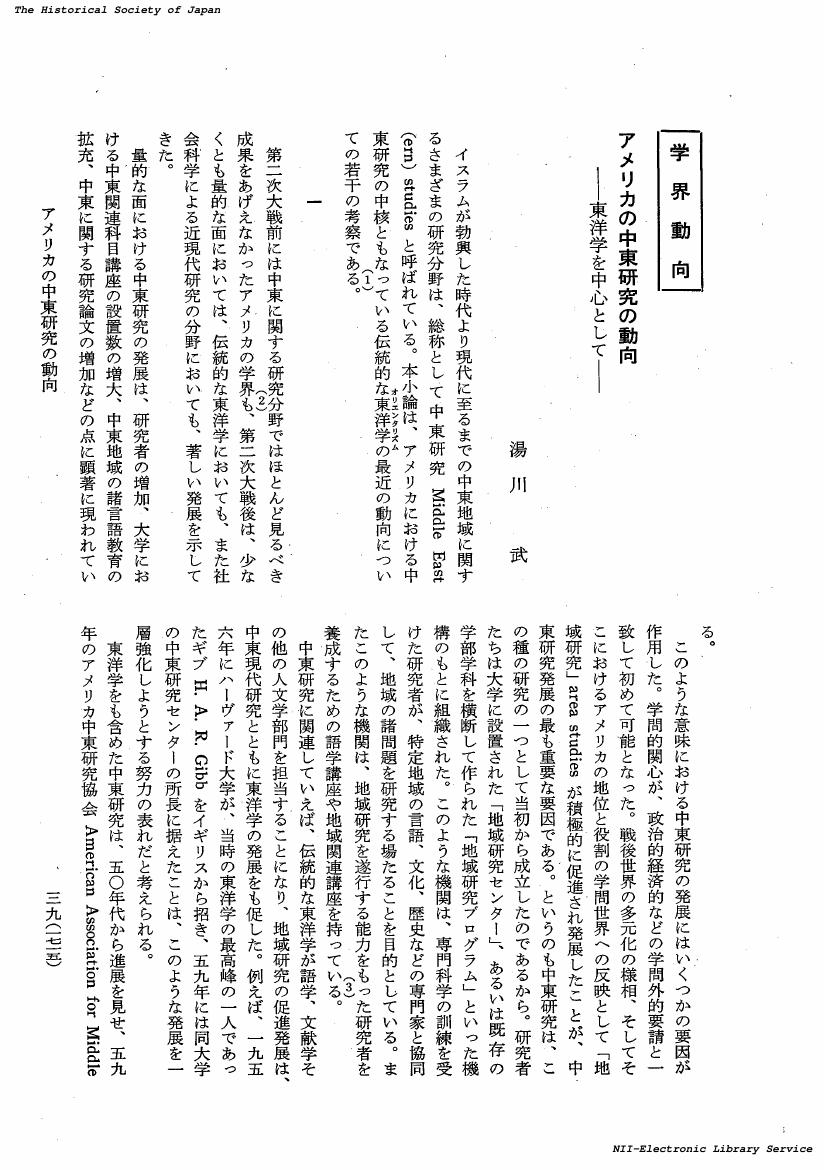5 0 0 0 シャリーアによる統治 : イスラーム政治論
- 著者
- イブン・タイミーヤ [著] 湯川武 中田考共訳
- 出版者
- 日本サウディアラビア協会
- 巻号頁・発行日
- 1991
3 0 0 0 OA アラブ・イスラーム世界におけるマルクス主義の展開―運動・哲学・歴史像をめぐって
- 著者
- 栗田 禎子 長澤 榮治 水島 多喜男 阿久津 正幸 小林 春夫 鈴木 規夫 阿久津 正幸 清水 学 千代崎 未央 平野 淳一 湯川 武
- 出版者
- 千葉大学
- 雑誌
- 基盤研究(B)
- 巻号頁・発行日
- 2013-04-01
従来、現代中東の社会運動をめぐる研究では、専らいわゆる「イスラーム主義」運動のみが脚光を浴びる傾向があったが、本研究では中東におけるマルクス主義の問題に着目し、その展開過程の特質を、運動、思想、歴史的・社会的背景という角度から分析した。研究の結果、中東のマルクス主義はこの地域の置かれた社会的・経済的現実と対峙し、地域に根ざした「知」の伝統(アラブ・イスラーム哲学の蓄積等)とも対話・格闘しながら発展してきたものであり、欧米からの単なる「移植」の産物ではないことが明らかになった。また、中東の社会・政治のあり方に関する従来の固定的・静態的イメージの見直しを行なうことができた。
2 0 0 0 OA アイユーブ朝とシシリー : サラディンとシシリー(<特集>東西交渉史)
- 著者
- 湯川 武
- 出版者
- 慶應義塾大学
- 雑誌
- 史学 (ISSN:03869334)
- 巻号頁・発行日
- vol.44, no.1, pp.89-95, 1971-10
特集東西交渉史
1 0 0 0 比較の手法によるイスラ-ムの都市性の総合的研究(総括班)
本研究計画は最終年度にあたり、総括班の連絡と調整のもとに研究活動のとりまとめが行なわれた。具体的には1.研究会の開催:公開性を原則とし、研究班組織にとらわれず、また研究分担者以外の研究者も参加した多様な形式の研究会が組織され成功した(3年間に191回)。とくに総括班の機能性を発揮して、クウェ-ト危機、地震、都市環境に関するセミナ-など現実の問題に即応した研究会がもてたことも成果のひとつである。2.第2回国際会議(中近東文化センタ-との共催 12月27〜29日)を開催し国際共同研究を充実させた。3.成果の流通:共同研究の新しいモデルとして、研究分担者や関連研究者に研究成果を迅速に公開することを目的とした出版活動も順調に行われた。3年間の出版物は231点になる。4・成果の公開性:特に今年度は研究成果の社会的還元のために、大学院生・学部学生を対象としたサマ-・スク-ル(7月23〜27日)を、一般市民を対象とした講演会を各地(仙台・大阪・福岡など)で開催した。1991年2月11〜12日の「大学と科学」公開シンポジウムー都市文明イスラ-ムの世界ーにも全面協力した。2.全体の研究活動のとりまとめとして全体集会(12月1〜2日)を開催し、共同研究・比較研究の総括がなされた。また、招へいしていたDale F.Eickelman、Hassan Hanafiの両氏より国際的見地からの評価ととりまとめに対する助言をうけた。3月23日には本研究のしめくくりの研究会を予定している。5.新たな理論枠組みに基づく研究成果のとりまとめとして、研究分担者全員および関連研究者が執筆に当たる『事典「イスラ-ムの都市性」』、『イスラ-ム都市研究史ー歴史と展望』、『イスラ-ム都市から世界史をみなおす』等の刊行が準備されている。
1 0 0 0 比較の手法によるイスラームの都市性の総合的研究(総括班)
イスラムの都市性を比較の視点から検討しその総合的解明を目指す本研究において、総括班は共同研究の実をあげるために、研究全体の活動の相互の連絡・調整に当たった。即ち、互いに関連する研究班の合同研究会やセミナーの開催、研究成果の発表のための出版活動、海外の研究者・研究機関との交流などに努めた。具体的には、1.研究会の開催:個別研究班を統合した合同研究会、外国人招聘研究員Anouar Abdel-Malek, Nurcholish Madjid氏を中心とした国際セミナー、在日中のMochtar Naim, Abdallah Hanna, Mahmud Hareitani, EmileA. Nakhleh氏を招いた研究集会や公開講演会を開催した。これにより、個別研究の枠を超えた情報交換を実現し、国際的共同研究を進展させ、成果を広く社会に還元することに努めた。2.成果の流通:研究成果を研究分担者全員が随時共有するため、ニューズレター「マディーニーヤ」(創刊準備号〜15号)、研究報告シリーズ(1〜23号)、研究会報告シリーズ(1〜7号)、Monograph Series(No.1〜8)、広報シリーズ(1〜2号)を出版し、国内外の研究者・研究機関に配布し、研究連絡網を確立した。3.総括班副代表の後藤明をアメリカ合衆国に派遣し、本研究活動に対する当地の研究者の協力を要請するとともに、関係学会、研究機関との研究協力態勢の確立につとめた。4.来年度開催予定の国際シンポジウムにむけて、数次にわたる準備連絡会議をもち、各セクションのテーマの設定、招聘研究者の選定などの作業を行った。すでに第二次サーキュラーを内外の研究者に配布した。以上の諸活動により、イスラム世界の都市性についての研究視角が明確化し、都市研究における新たな参照テーマとしてイスラム圏の都市研究の重要性が広く認識され、活発な比較研究を刺激・促進する結果を生んだ。
1 0 0 0 OA アメリカの中東研究の動向 : 東洋学を中心として
- 著者
- 湯川 武
- 出版者
- 公益財団法人 史学会
- 雑誌
- 史学雑誌 (ISSN:00182478)
- 巻号頁・発行日
- vol.87, no.12, pp.1715-1725, 1978-12-20 (Released:2017-10-05)
- 著者
- 湯川 武
- 出版者
- 東洋史研究會
- 雑誌
- 東洋史研究 (ISSN:03869059)
- 巻号頁・発行日
- vol.53, no.3, pp.578-578, 1994-12-30
- 著者
- 湯川 武
- 出版者
- 慶應義塾大学
- 雑誌
- 史学 (ISSN:03869334)
- 巻号頁・発行日
- vol.41, no.4, pp.620-621, 1969-03
研究発表要旨彙報
1 0 0 0 OA 中世イスラム世界におけるウラマーの移動性
- 著者
- 湯川 武
- 出版者
- 一般社団法人 日本オリエント学会
- 雑誌
- オリエント (ISSN:00305219)
- 巻号頁・発行日
- vol.22, no.2, pp.57-74, 1979 (Released:2010-03-12)
One of the characteristic features of the medieval ‘ulama’ was their high geographical mobility. Pilgrimage, travelling for academic purposes and commercial activities, sometimes a combination of some or all of these, were its important factors while many ‘ulama’ were attracted for better job opportunities in other places.A need for Sunni ‘ulama’ in Egypt was first created by Saladin when he destroyed the Fatimids and began to rebuild Sunnism in Egypt. During the Ayyubid and early Mamluk period more ‘ulama’ flowed into Egypt from different parts of the Islamic world. Among them were many from the Islamic West. Even during the Fatimid period there was a connection between Western and Egyptian ulama i n the fields of hadith and Maliki law studies.Those Western ‘ulama’ can be classified into two types; one was the transit type and the other the settler type. Those belonging to the first contributed to the exchange of scholarship, bringing to Egypt some of Western achievements and back home more knowledges and skills from the East. But more important was their contribution to the promotion of the general feeling of Islamic unity and solidarity by teaching the population both of Egypt and the West through their contacts with local ‘ulama’ and their other travelling experiences in other lands.The contributions of the second type was more concrete; many Maliki fuqaha' who came to Egypt and lived there permanently played a significant role in establishing the Maliki law school there by working as teachers and sometimes as qadis. In other fields of scholarship, many individual scholars from the West made great contributions; to name a few, al-Shatibi in the qira'a, al-Qurtubi in the tafsir and Abu Hayyan in the philology. Another point we cannot neglect is that the western ‘ulama’ in Egypt were mostly Sufi is or zahids and helped the diffusion of sufism in Egypt.All in all, they were the beneficiaries of the general feeling of Islamic unity and they themselves in turn strived to promote and materialize this feeling.


